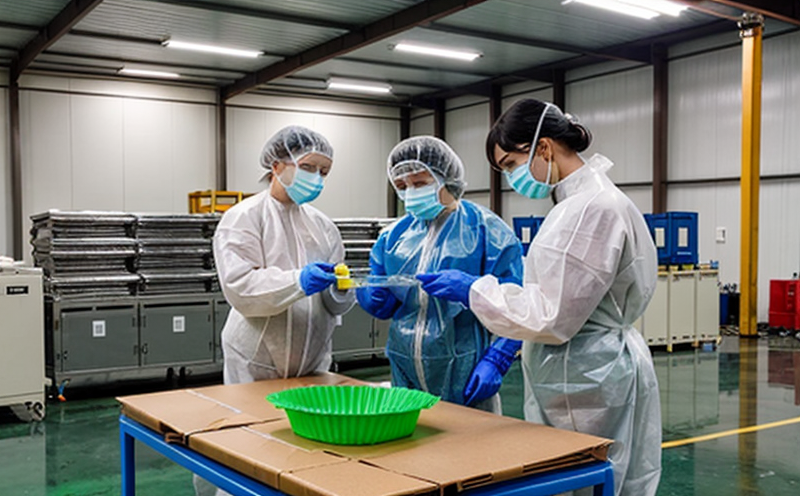ISO 527-3 Tensile Testing for Molded Plastics
The ISO 527-3 standard specifies the procedure for tensile testing of molded plastics. This method is widely used to evaluate the mechanical properties of plastic materials, including their strength and flexibility under tension.
Understanding the physical characteristics of molded plastics is essential for quality managers, compliance officers, R&D engineers, and procurement professionals in various sectors such as automotive, electronics, pharmaceuticals, and consumer goods. The tensile test provides critical data that helps ensure product reliability and safety while also contributing to sustainable design practices.
The primary purpose of ISO 527-3 is to standardize the procedure for conducting tensile tests on specimens cut from molded plastic parts or materials. This ensures consistent results across different laboratories, which is vital for quality assurance and regulatory compliance. The test involves applying a controlled force to a specimen until it breaks. Key parameters include the gauge length (the portion of the sample subjected to tension) and the crosshead speed.
For molders and manufacturers, this service offers valuable insights into how their materials perform under stress conditions. By understanding these properties, they can optimize formulations, improve process controls, and enhance product performance. Compliance officers rely on such data to ensure that products meet regulatory requirements for safety and durability.
In the context of environmental sustainability, tensile testing plays a role in evaluating the long-term performance of plastics under various conditions. This helps manufacturers design products with reduced environmental impact by selecting materials that maintain their integrity over extended periods without compromising functionality.
- Customer Impact: Enhanced product reliability and safety lead to customer trust and satisfaction.
- Better Decision-Making: Data from tensile tests informs critical decisions about material selection and process optimization.
- Regulatory Compliance: Ensures that products meet international standards, avoiding costly penalties or recalls.
In summary, ISO 527-3 Tensile Testing for Molded Plastics is a fundamental tool in the quality assurance toolkit. It provides essential information that supports informed decision-making and contributes to product innovation and sustainability efforts within organizations.
Eurolab Advantages
At Eurolab, we offer comprehensive services tailored specifically to meet your needs regarding ISO 527-3 Tensile Testing for Molded Plastics. Our state-of-the-art facilities and experienced technical staff ensure that every test is conducted with precision and accuracy.
- Expertise: Our team comprises highly trained professionals who are well-versed in the latest techniques and best practices associated with this type of testing.
- Technology: Utilizing advanced instrumentation, we provide precise measurements that contribute to reliable test results.
- Consistency: We adhere strictly to international standards, ensuring consistency across all tests performed at our facility.
- Support: From initial consultation through final report generation, our dedicated support staff is available to assist you every step of the way.
By choosing Eurolab for your ISO 527-3 Tensile Testing requirements, you can rest assured that your materials are being evaluated using the most rigorous and up-to-date methods available today. This commitment to excellence sets us apart from other providers in the industry.
Customer Impact and Satisfaction
The impact of accurate tensile testing on customer satisfaction cannot be overstated. Reliable test results lead directly to higher quality products, which in turn result in greater customer trust and loyalty. When manufacturers can consistently produce high-quality materials, it translates into better-performing end products that meet or exceed expectations.
- Enhanced Reputation: Consistent adherence to international standards enhances an organization’s reputation among clients and industry peers alike.
- Increased Sales: Products known for their reliability often see increased demand due to positive word-of-mouth referrals and repeat business from satisfied customers.
- Long-Term Relationships: Companies that consistently deliver on quality promises build lasting relationships with their customer base, fostering long-term partnerships.
In addition to these tangible benefits, the ability to provide accurate and reliable tensile testing also contributes significantly to internal processes within an organization. It fosters a culture of continuous improvement by encouraging regular reviews and updates based on real-world performance data. This approach not only improves current products but also drives innovation for future generations.
Ultimately, when organizations invest in robust quality assurance measures like ISO 527-3 Tensile Testing, they set themselves apart as leaders in their respective fields. These investments pay off handsomely through improved customer satisfaction and sustained competitive advantage.





